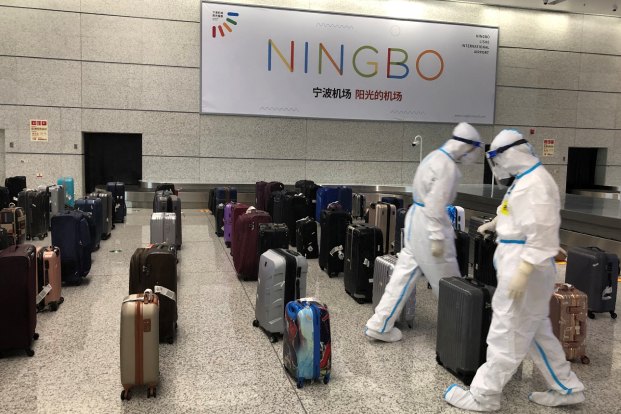Multiple companies have suspended operations in one of China’s biggest manufacturing hubs as local authorities try to contain a COVID-19 outbreak, halting production of goods from batteries to textile dyes and plastics.
At least 20 listed companies have shut operations in virus-hit areas in Zhejiang, an eastern province with a large industrial sector that accounts for around 6% of China’s GDP and where many goods are manufactured for export.
Tens of thousands of Zhejiang residents are in quarantine and some domestic flights have been suspended as a national health official said the outbreak in three cities – Ningbo, Shaoxing and Hangzhou – was developing at a “relatively rapid” speed.
The three cities accounted for more than 50% of the province’s economic output of around 6.46 trillion yuan ($1.02 trillion) last year.
Zhejiang reported 44 locally transmitted cases with confirmed symptoms on Monday December 13, official data showed on Tuesday, taking the total to 217 just over a week since the first case was reported on December 6. Prior to the current outbreak, the province had reported just one local case this year.
Companies reporting suspended production on Tuesday included Zhejiang Mustang Battery Co, Guobang Pharma Ltd and textile dyes maker Zhejiang Runtu Co.
Ningo-based Mustang Battery said it expected the outbreak to be brought under control very soon, and the production suspension was a temporary measure that “will not have a long-term negative impact on the company’s growth.”
Zhejiang Runtu said all its units in the Zhejiang Shangyu Economic Development Zone (SEDZ), which accounts for 95% of its revenue, had been halted since December 9 and it expected a negative impact on its fourth quarter results.
There are more than 350 industrial enterprises in the zone, which is located near the cities of Ningbo, Hangzhou, Shanghai, Suzhou and Wenzhou.
Ningbo Homelink Eco-Itech Co, Zhejiang Zhongxin Fluoride Materials Co, Zhejiang Jingsheng Mechanical & Electrical Co and Zhejiang Fenglong Electric Co have also suspended work in affected areas.
The companies said they halted operations in line with local government orders in Zhenhai district in Ningbo and Shangyu district in Shaoxing, which curtailed all production bar essential manufacturing.
The orders cover all companies in the affected areas, but only listed firms are required to disclose any impact on their business.
Major industries in Zhenhai, which has a port, include manufacturing of precision machinery and chemicals. The district also hosts factories with investments by more than 700 foreign companies including LG Electronics and Toshiba, according to the Zhenhai government’s website.
Sinopec’s Zhenhai Refining and Chemicals, the biggest oil refinery in China, said on Tuesday it was maintaining a high operational rate despite tightened Covid measures. The refinery, which has annual crude oil refining capacity of 460,000 barrels-per-day, is currently processing 60,000 tonnes of crude oil each day, the company said in statement.
Over 50,000 in Quarantine
More than 50,000 people have been quarantined at centralised facilities across the coastal province of 64.4 million, while a further nearly half a million people were being monitored.
Zhejiang has ordered travel agencies to suspend organising tourism trips linking the province and other areas and has also halted province-level sports events.
Wenzhou and Yiwu, two cities in Zhejiang yet to report local cases from the latest outbreak, ordered the closure of entertainment venues such as bars and chess and card parlours.
Apart from the 74 local symptomatic infections in Zhejiang, Shaanxi province and the northern Chinese region of Inner Mongolia reported one and five local cases respectively on Sunday.
As of December 12, mainland China had 99,780 symptomatic cases, including those arriving from abroad. The death toll remained unchanged at 4,636.
- Reuters with additional editing by Kevin Hamlin
This report was updated on December 14.
ALSO READ:
Chinese Firms Halt Production in Zhejiang Amid Covid Outbreak
Zhejiang Province Raises Power Prices: SCMP
Zhejiang’s digital economy grows
























